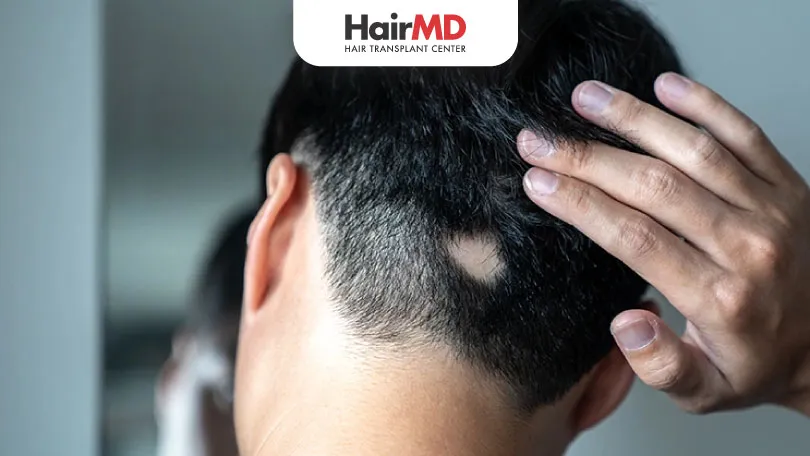15th September, 2021

Alopecia areata is an autoimmune condition that can cause sudden, patchy hair loss, affecting both the scalp and other areas of the body. The condition can be alarming, but understanding its triggers and treatment options is essential for managing it.
This blog explores the causes, symptoms, and treatments, including corticosteroid injections and topical immunotherapy, which can help in promoting hair regrowth. If you’re struggling with alopecia areata, this guide offers insights into battling the condition and reclaiming your hair.
What’s covered in the article?
- Are you being Tormented by Alopecia Areata?
- Conclusion
Are you being Tormented by Alopecia Areata?
Losing your hair in patches just like the foxes do twice a year, that is what it signifies literally. Scientifically speaking it is an autoimmune disorder afflicting your skin causing hair loss in patches from your scalp as well as from other areas of your body. It doesn’t pertain to a particular sex group or age group but is not common before 3 years of age. It is a rare condition with chances that the hair loss might spontaneously grow back or it might even call for a treatment. This blog is concerned with the prevailing issue and ways to counteract it.
It is characterized by well-defined circular patchy hair loss. These areas are typically circumscribed and are not limited just to your scalp. So if you oversee an increase in hair loss marking your pillows or shower time you might want to stay uptight about the issue. Being in the age group of 30-60 years puts you at a greater risk.
Normally our body is blessed with certain fighter cells called the white blood cells which recognize the invading external threat that maybe a bacteria or a virus, reaches the target of action and destroys the threat thus rendering your body safe. But in an autoimmune condition like this, the white blood cells get alienated and behave erratically. They lose their judgment powers over the good and the bad, as a result, they start attacking the healthy cells of our own body like the hair follicles.
This destroys the follicles and leaves you to impending baldness. Though the exact reason behind has not been discovered yet it is seen that it runs down in families. So if you have a legacy of diabetes or any other autoimmune condition tracing your family tree, you need to stay on guard. It can sabotage any of us and instead of wasting our time getting upset over the issue it would be a wise idea to go on and ponder on defeating it.
Though it cannot be treated, it definitely can be beaten to an extent where it’ll stay at bay while you get your luscious locks back. This includes taking an injection of corticosteroids, topically applying chemicals to your head prescribed obviously by a doctor (topical immunotherapy) or taking minoxidil. Cloaking your hair from dust exposure and curbing your levels of stress also remains beneficiary to the process.
Good Resource!
Do You Know?
Nearly 250 Patients Visit HairMD
Everyday For Various Hair Concerns?
(Your journey to healthier and fuller hair starts here!)
Meet Our Dermatologists
Conclusion
In conclusion, while alopecia areata can be a distressing condition, it is often manageable with the right treatments and support. Early intervention, such as corticosteroids, topical treatments, and lifestyle changes, can improve the chances of hair regrowth and prevent further hair loss. Consulting a dermatologist is key to getting a personalized treatment plan that suits your specific needs and helps you regain confidence.
Further Reading
How to Treat Alopecia Areata at Home: Natural Solutions for Hair Growth
Explore home remedies for alopecia areata to promote hair regrowth and boost confidence from home.
What Is The Best Treatment For Alopecia Universalis?
Learn about the best treatments for alopecia universalis, a condition causing total hair loss. Explore expert-recommended therapies and options for hair regrowth at HairMD.
Alopecia Care: Advanced Treatment Options for Men and Women
Explore alopecia treatments for men and women: minoxidil, laser therapy, and expert consultations in Pune. Find effective solutions!
When Does Alopecia Areata Typically Begin? Key Age Insights
Alopecia areata can start at any age, but often begins in teens, twenties, or thirties. Learn more about its onset and impact
Have thoughts? Please let us know
We are committed not only to treating you, but also educating you.











